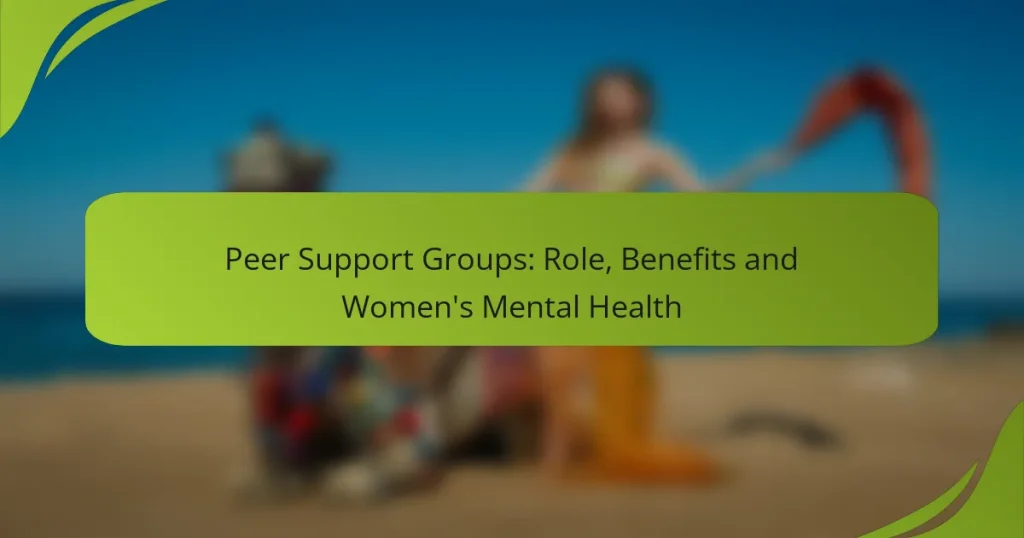Peer support groups play a crucial role in promoting women’s mental health by providing a safe and supportive environment for sharing experiences and challenges. These groups not only foster meaningful connections among participants but also offer emotional and practical benefits that can significantly enhance overall well-being. With various options available, women can easily find groups tailored to their specific needs, whether online or within their local communities.
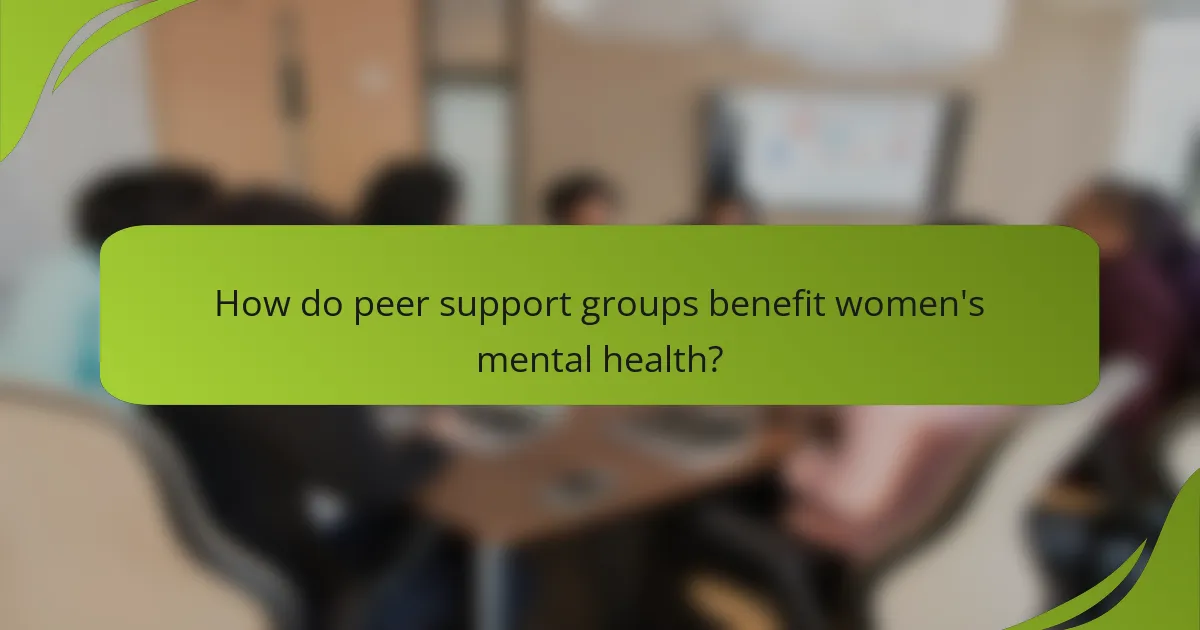
How do peer support groups benefit women’s mental health?
Peer support groups provide a safe space for women to share their experiences and challenges, leading to significant improvements in mental health. These groups foster connections and offer various emotional and practical benefits that can enhance overall well-being.
Emotional support and validation
Emotional support is a cornerstone of peer support groups, allowing women to express their feelings without judgment. This validation helps individuals feel understood and accepted, which can alleviate feelings of anxiety and depression.
Sharing personal stories in a supportive environment reinforces the idea that others face similar struggles, creating a sense of belonging that is crucial for mental health.
Improved coping strategies
Women in peer support groups often exchange effective coping strategies that have worked for them. This collective wisdom can introduce new techniques for managing stress, anxiety, and other mental health challenges.
For example, members might share mindfulness practices, journaling techniques, or self-care routines that have proven beneficial, allowing others to try different approaches that may resonate with them.
Reduced feelings of isolation
Participating in peer support groups can significantly reduce feelings of isolation by connecting women with others who share similar experiences. This sense of community combats loneliness and fosters friendships that extend beyond the group.
Regular meetings create a routine and a network of support, reminding participants that they are not alone in their struggles.
Access to shared resources
Peer support groups often serve as a hub for sharing valuable resources, such as mental health professionals, workshops, and community services. Members can recommend therapists, books, or local events that have helped them.
This access to information can empower women to seek additional help and engage in activities that promote their mental well-being.
Empowerment through shared experiences
Sharing experiences in a peer support group can empower women by highlighting their resilience and strength. Hearing how others have navigated similar challenges can inspire hope and motivate individuals to take proactive steps in their mental health journey.
As women share their successes and setbacks, they build confidence in their ability to cope and thrive, fostering a sense of agency over their mental health.
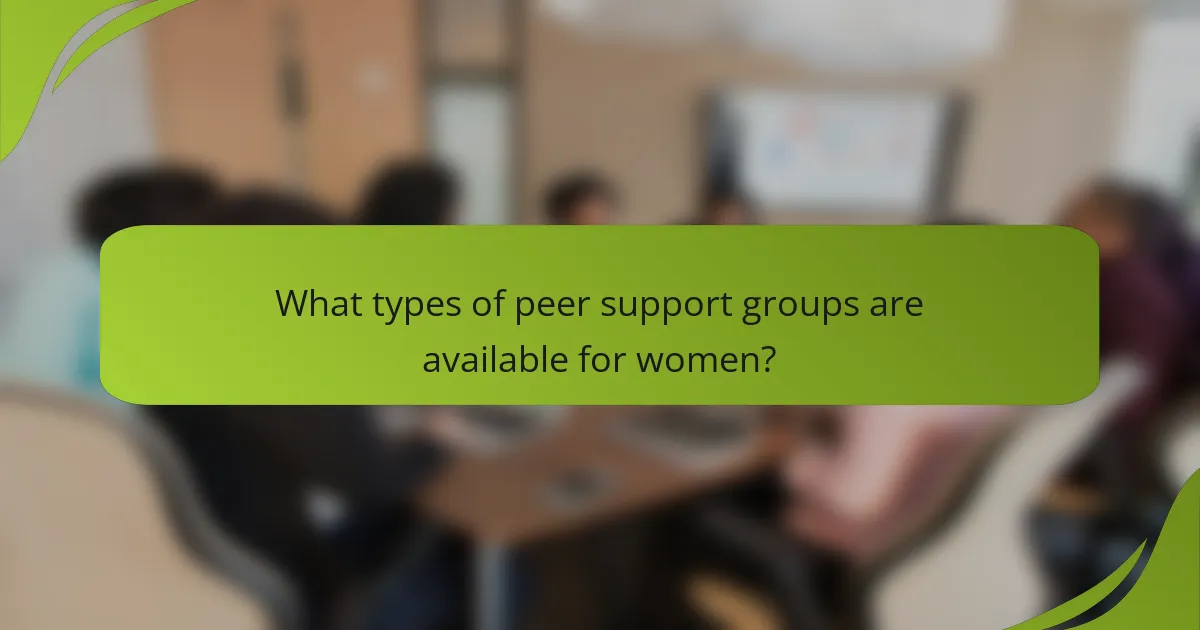
What types of peer support groups are available for women?
Women can access various types of peer support groups, each designed to meet different needs and preferences. These groups can be found online, in local communities, or focused on specific issues affecting women’s mental health.
Online support communities
Online support communities offer women a convenient way to connect with others facing similar challenges. Platforms like Facebook, Reddit, and dedicated mental health forums provide spaces for sharing experiences, advice, and encouragement.
When joining an online group, consider the community’s focus and rules. Look for active groups with a positive atmosphere, and ensure they prioritize privacy and respect among members.
Local in-person meetups
Local in-person meetups allow women to engage face-to-face, fostering deeper connections and support. These gatherings can take place in community centers, cafes, or parks, often organized through local mental health organizations.
To find a suitable meetup, check local listings, community boards, or social media groups. Be open to trying different groups to find one that resonates with you, and remember to prioritize your comfort and safety in any setting.
Specialized groups for specific issues
Specialized groups focus on particular issues such as postpartum depression, anxiety, or chronic illness. These groups provide tailored support and resources, helping women navigate their unique challenges.
When seeking a specialized group, research local mental health services or online platforms that offer targeted support. Ensure the group is led by qualified facilitators who understand the specific issues being addressed, and consider the group’s size and dynamics for optimal engagement.
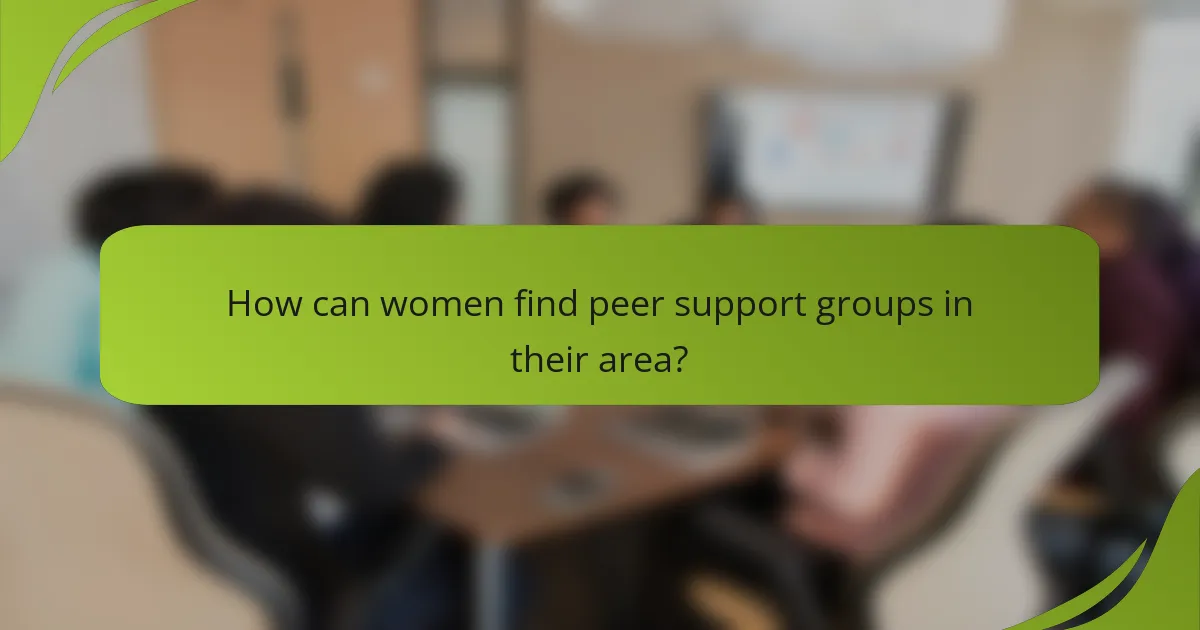
How can women find peer support groups in their area?
Women can find peer support groups in their area by utilizing various resources such as mental health organizations, social media platforms, and community health centers. These avenues provide access to local groups that cater to women’s mental health needs and foster supportive environments.
Utilizing mental health organizations
Many mental health organizations offer directories or resources to help women locate peer support groups. National and local organizations, such as the National Alliance on Mental Illness (NAMI) or Mental Health America, often maintain lists of available groups based on specific needs and locations.
When searching, consider reaching out directly to these organizations for personalized recommendations. They can provide information on meeting times, locations, and any associated costs, which are often minimal or free.
Searching social media platforms
Social media platforms can be valuable tools for finding peer support groups. Many groups are formed on platforms like Facebook, where users can join private groups focused on women’s mental health topics.
To find these groups, use search terms like “women’s mental health support” or “peer support for women.” Be mindful of the group’s privacy settings and ensure it aligns with your comfort level regarding sharing personal experiences.
Exploring community health centers
Community health centers frequently offer peer support groups as part of their mental health services. These centers may provide a range of programs tailored to women’s specific mental health challenges.
Visit or contact local health centers to inquire about available support groups. Many centers offer free or low-cost services, making them accessible for women seeking help without financial strain.

What are the key characteristics of effective peer support groups?
Effective peer support groups are characterized by trained facilitators, clear guidelines, and diverse membership. These elements help create a safe and supportive environment where individuals can share experiences and receive encouragement.
Facilitator training and experience
Trained facilitators are crucial for the success of peer support groups. They should possess skills in active listening, conflict resolution, and group dynamics to guide discussions effectively. Experience in mental health or related fields can enhance their ability to manage sensitive topics.
Facilitators should also be familiar with the specific needs of the group members, which may include understanding trauma-informed care. Regular training updates can help facilitators stay informed about best practices and emerging trends in mental health support.
Clear group guidelines and goals
Establishing clear guidelines and goals is essential for maintaining focus and safety within peer support groups. Guidelines should outline expectations for participation, confidentiality, and respectful communication. This helps create a trusting environment where members feel comfortable sharing.
Goals should be specific and achievable, such as improving coping strategies or reducing feelings of isolation. Regularly revisiting these goals can help keep the group aligned and motivated, ensuring that everyone is working towards a common purpose.
Diverse and inclusive membership
A diverse and inclusive membership enriches peer support groups by bringing various perspectives and experiences. This diversity can enhance discussions and foster empathy among members. It is important to actively encourage participation from individuals of different backgrounds, including race, gender, and socioeconomic status.
Inclusivity also means being aware of and accommodating different needs, such as language barriers or accessibility requirements. Creating a welcoming atmosphere for all can significantly improve the effectiveness of the group and the overall mental health of its members.
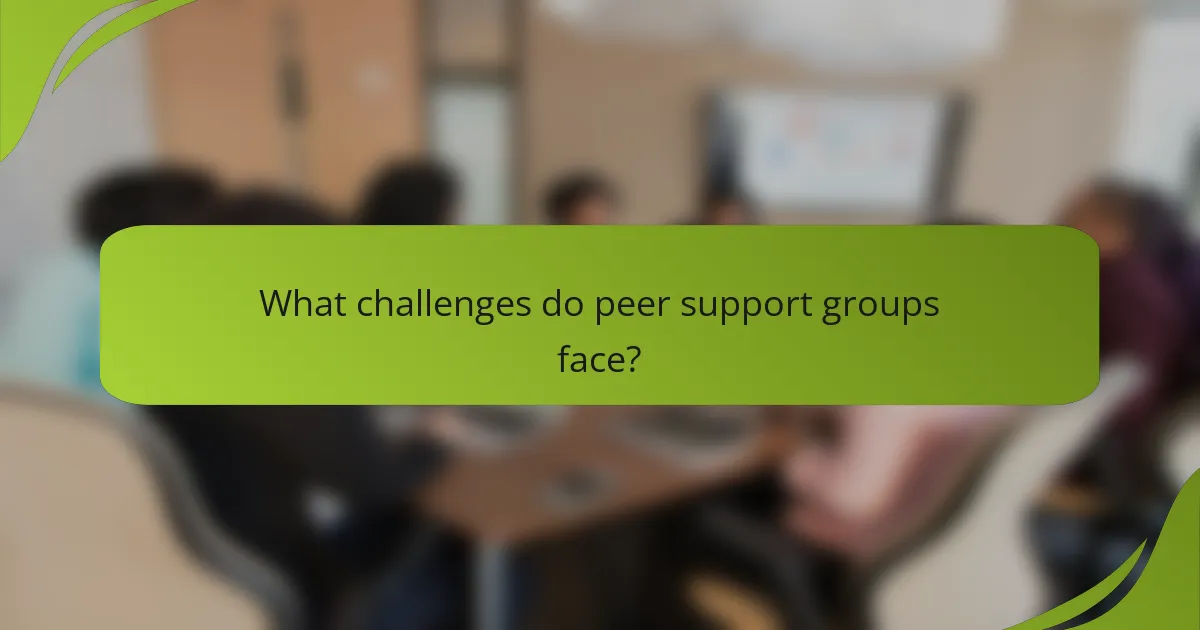
What challenges do peer support groups face?
Peer support groups encounter several challenges that can hinder their effectiveness, including maintaining engagement, ensuring confidentiality, and managing group dynamics. Addressing these issues is crucial for creating a supportive environment that fosters mental health and well-being.
Maintaining group engagement
Keeping participants actively engaged in peer support groups can be difficult, especially over time. Regularly scheduled meetings and varied activities can help sustain interest and participation.
Incorporating interactive elements, such as workshops or guest speakers, can also enhance engagement. Additionally, soliciting feedback from group members about their needs and preferences can ensure that the group remains relevant and appealing.
Addressing confidentiality concerns
Confidentiality is a critical issue in peer support groups, as participants often share personal and sensitive information. Establishing clear guidelines about what can and cannot be shared outside the group is essential for building trust.
Group leaders should emphasize the importance of confidentiality during initial meetings and regularly remind members of these guidelines. Providing written agreements can also reinforce the commitment to privacy and encourage a safe sharing environment.
Managing group dynamics
Group dynamics can significantly impact the effectiveness of peer support groups. Leaders must be aware of different personalities and communication styles within the group to facilitate healthy interactions.
Encouraging respectful dialogue and addressing conflicts promptly can help maintain a positive atmosphere. Additionally, training for group leaders on conflict resolution and group facilitation can enhance their ability to manage diverse dynamics effectively.
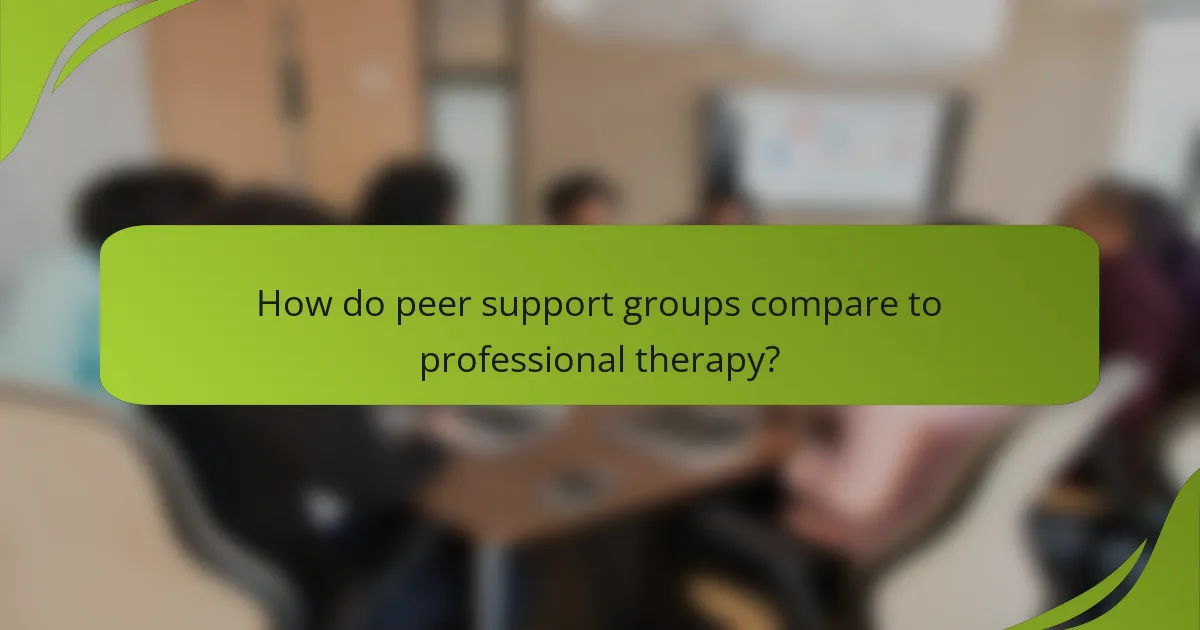
How do peer support groups compare to professional therapy?
Peer support groups offer a different approach to mental health than professional therapy, focusing on shared experiences rather than clinical guidance. While therapy typically involves a trained professional providing structured treatment, peer groups emphasize mutual support and understanding among participants.
Understanding the Differences
Peer support groups are often led by individuals who have experienced similar challenges, creating a sense of community and shared understanding. In contrast, professional therapy is conducted by licensed therapists who apply specific techniques and interventions based on clinical training. This distinction can influence the depth of support and the type of guidance available.
Benefits of Peer Support Groups
Peer support groups can foster a sense of belonging and reduce feelings of isolation, which is particularly beneficial for women facing mental health issues. Participants often find comfort in sharing their stories and learning from others, which can enhance coping strategies. Additionally, these groups are usually free or low-cost, making them accessible to a broader audience.
Limitations of Peer Support Groups
While peer support groups provide valuable emotional support, they may lack the professional expertise needed for severe mental health conditions. Participants should be cautious about relying solely on these groups, especially if they require clinical intervention. It’s essential to recognize when professional therapy might be necessary for more complex issues.
When to Choose Professional Therapy
Choosing professional therapy is advisable when dealing with serious mental health disorders, such as severe depression or anxiety, where specialized treatment is crucial. If symptoms interfere with daily functioning or if there is a risk of self-harm, seeking a licensed therapist is essential. Therapy can provide tailored strategies and interventions that peer support groups cannot offer.
Combining Both Approaches
Many individuals find that a combination of peer support and professional therapy works best for their mental health. Engaging in a peer group can provide ongoing emotional support, while therapy addresses specific mental health challenges. This dual approach can enhance overall well-being and create a more comprehensive support system.
